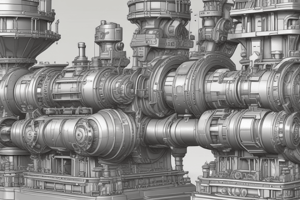Podcast
Questions and Answers
What is the purpose of forming 'hard and wear resistant martensite' in the outer case of the components?
What is the purpose of forming 'hard and wear resistant martensite' in the outer case of the components?
- To reduce the overall strength of the components
- To increase the overall ductility of the components
- To improve the inner layer composition of the components
- To enhance the surface hardness and wear resistance (correct)
Why is 'conventional through hardening' not effective for these components?
Why is 'conventional through hardening' not effective for these components?
- It increases the overall ductility of the components
- It causes excessive softening of the outer surface
- It does not produce the desired properties throughout the cross-section (correct)
- It results in chemical reactions within the core
What type of steel is surface hardening applicable to?
What type of steel is surface hardening applicable to?
- Tool steels
- Low carbon steels
- High carbon steels and alloy steels (> 0.4% carbon) (correct)
- Stainless steels
What is formed in the core during the process of flame hardening?
What is formed in the core during the process of flame hardening?
What type of reactions occur during surface hardening?
What type of reactions occur during surface hardening?
Why is conventional through hardening not effective for components requiring hard and wear resistant martensite in the outer case and soft and ductile core?
Why is conventional through hardening not effective for components requiring hard and wear resistant martensite in the outer case and soft and ductile core?
What is formed in the outer surface during the process of flame hardening?
What is formed in the outer surface during the process of flame hardening?
Which type of steel is surface hardening applicable to?
Which type of steel is surface hardening applicable to?
What occurs in the core during the process of flame hardening?
What occurs in the core during the process of flame hardening?
What makes 'high carbon steels' and 'alloy steels' suitable for surface hardening?
What makes 'high carbon steels' and 'alloy steels' suitable for surface hardening?
Flashcards are hidden until you start studying





